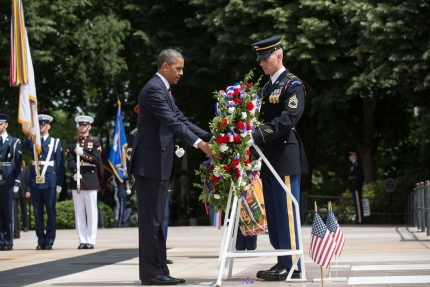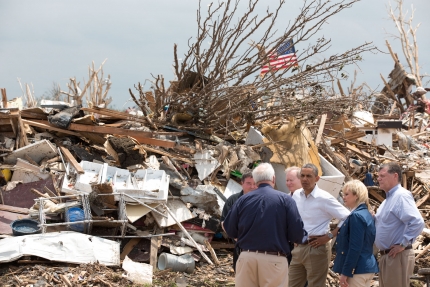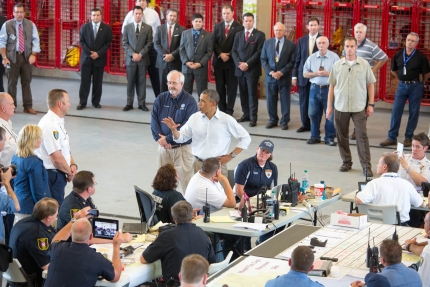Press Gaggle by Principal Deputy Press Secretary Josh Earnest en route Moore, OK, 5/26/2013
Aboard Air Force One
En Route Moore, Oklahoma
10:46 A.M. EDT
MR. EARNEST: Good morning and welcome aboard Air Force One as we make our way to Oklahoma, where communities were torn apart by violent tornadoes and severe weather earlier this week.
You’ll hear directly from the President later this afternoon, but he’s traveling today to offer his condolences to those who have lost so much, and reiterate his commitment and the nation’s commitment to the people of Oklahoma as they recover and rebuild.
This is the greatest nation on Earth and we’re going to dedicate this nation’s time, attention, resources and expertise to help our people in their time of urgent crisis.
Now, the President today will be looking at and talking about the heroic rescue and recovery effort that’s underway, but the full story starts earlier than that. On May 15th, five days before Monday’s destructive tornadoes, the National Weather Service’s storm prediction center based in Oklahoma forecasted a threat of a major severe weather outbreak in the area and communicated this forecast to state and local officials, the media, and the general public.
Two days later, on May 17th, they briefed national and regional FEMA personnel. On May 19th, the day before the worst of the storm, FEMA personnel were already in place at the state’s emergency operation center. On May 20th, at 10 a.m., more than four hours before the storm hit, the Norman Forecast Office hosted a conference call with local officials, including emergency personnel, school and hospital administrators, and other local officials about the potential for violent weather and the acute risk, in particular, at school dismissal time.
Now, as you’ve heard, 16 minutes before the tornado developed and 36 minutes before the tornado entered Moore, a tornado warning was issued. This is significantly earlier than the average tornado warning time of around 12 minutes. Now, that doesn’t sound like much time, but for many people it’s the time needed to find their way into a storm shelter or take other necessary precautions.
When Moore Medical Center took a direct hit from the storm, not a single person inside the hospital was injured by the storm because of the preparations that were made in response to the early warnings. These advancements made by government scientists in the field of weather forecasting at these agencies are dramatic and are saving lives.
Now, the response, led by state and local officials and supported by FEMA, has been heroic. More than 450 FEMA personnel are on the ground, including IMAT teams, urban search-and-rescue teams, emergency communications teams and others that were deployed within hours after the storm struck.
On Monday night, also within hours of the storm, the President signed a disaster declaration to free up additional resources and support for state and local officials, as well as assistance to the individuals affected by the storm.
So far, 4,200 individuals have applied for assistance, totaling $3.4 million. Now, people should know that they can apply for assistance by calling 1-800-621-FEMA or by going to DisasterAssistance.gov. This is in addition to the 43,000 meals, 150,000 liters of water, and thousands of cots, blankets, and tarps that have also been provided.
So that gives you a sense of where we stand today. And the President’s message is that support is not winding down. As demonstrated by our efforts in Tuscaloosa, in Joplin, and those communities in Connecticut, New York, and New Jersey that were affected by Sandy, we’ll be standing with the people of these resilient communities as they come back stronger than ever.
So with that long windup, we’ll take some questions.
Q So can I ask you a little bit about the recovery efforts? How much debris does FEMA have to haul out of here? Do you have any figures on that?
MR. EARNEST: I don’t any figures on that. I know that, again, it’s state and local officials who are principally responsible for those kinds of efforts, but certainly FEMA resources are often used to support those efforts. In terms of the cubic -- the volume or the tonnage of something like that, I’ll ask around a little bit when we’re on the ground and see if I can get you some more data about that. So obviously, I think we’ll see firsthand that the destruction was not just intense but widespread. So I’m sure the numbers are pretty staggering, but let me see if we can quantify that in some way.
Q And, obviously, in particular, one of the most tragic things was the deaths at the school. What have you learned about those children who were killed? Were they in one area of the school? Were they throughout? There are a lot of questions about structurally what should happen going forward with the schools.
MR. EARNEST: I actually don’t have those kinds of details in front of me, but we’ll see if we can get some more information about this over the course of the day today.
Q Josh, is the President going to highlight the forecasting piece that you’re talking about?
MR. EARNEST: The President will have the opportunity when we’re on the ground in Oklahoma to talk to some of the forecasters that are doing some of the really interesting work here scientifically.
In terms of the advancements that have been made in forecasting, the advancements are really interesting, both because they are providing people greater warning in terms of time, but they’re also becoming much more specific in terms of being able to target which specific areas are likely to bear the brunt of the severe weather. So there’s some really interesting work that’s going on. And I think for a good reason, a lot of that work is actually going on in Oklahoma.
So some of the foremost experts in this field are actually based here in Oklahoma, and the President will have the opportunity to visit with some of them while he’s on the ground today.
Q Josh, there is some reporting right after the storm about some houses and other public buildings either not having basements or not having safe rooms because of the cost. Does the President believe that there should be more federal funding for something like that? Or does he have a position on that at all?
MR. EARNEST: Well, I think that we have seen that, particularly in these communities that take a direct hit from a severe tornado like the one that we saw here on Monday, that these storm shelters can be the difference between life and death.
I know that FEMA has already been instrumental in providing some resources to make the construction of these storm shelters more economically feasible. I think in just the state of Oklahoma alone, FEMA has provided $57 million in funding in the form of rebates and other incentives that would encourage people to build these kinds of storm shelters.
I know that Governor Fallin has talked about how helpful that thorough assistance has been. But obviously, these kinds of -- these shelters do make a difference.
Q Josh, how much do you think this whole disaster area talks about the differences in the party -- what the parties believe about the size of government and what government should and shouldn’t be doing? Obviously, Republicans talk a lot about shrinking the size of government. Is a day like today an example of the President saying to those folks, look, you know, there actually has to be investment? I mean, is there a political element to that?
MR. EARNEST: Well, to take the last part of your question first, today is not a day for politics. The President is going to be focused today on, as I mentioned, offering his condolences to the people in these communities who were affected. You’re talking to the people who have lost a lot -- either the lives of family members of friends, or they’ve seen all of their physical possessions taken away from them.
So it’s not a day for politics. That said, I think it is evident to any impartial observer here what an important role the federal government can play in providing assistance to our people at their time of urgent need. And you talk about an agency like FEMA that, when this President took office, did not have a very good reputation, and I think there were some failures that were widely reported about their response to previous natural disasters.
Craig Fugate, the current administrator for FEMA, is a widely regarded expert in this area. Based on my own personal experience -- I worked on the Governor’s race in 2006 in the state of Florida, and one of the first promises made by both the Democratic candidate and the Republican candidate for governor was to reappoint Craig Fugate as the state’s emergency manager because he had such a strong reputation there.
So the President -- when the President appointed him to his job, without regard to political persuasion, the President chose the best person for the job. And I think it’s important that you have somebody like Mr. Fugate, who has an expertise in this area, running this agency. And I think it’s evident, and I think we’ll see a little bit of that even today, the difference that that has in the lives of people who have been affected in such a traumatic way.
Q In the last six months or so -- Newtown, the President went to Texas, the President was in Boston in April. What kind of role does he see himself playing when he goes to sort of comfort the families in the wake of such a tragedy?
MR. EARNEST: I think it’s important -- the President believes that it’s important for people to understand, people in these communities to understand, that the entire nation is standing with them in their time of need; that it’s important for -- that our country, for all of the political turmoil and strife and strident debate that goes in our nation’s capital, that the people of this nation are united by something much stronger than political debate.
Those political differences are genuine, but they in no way undermine the bonds among the people of this country and the symbolism of the leader of this country -- as I mentioned, the greatest country on Earth -- traveling to a community in a time of crisis and articulating not just his own personal condolences for their loss, but his own personal resolve and the resolve of the country to ensure that they have the resources and the expertise of the greatest nation on Earth to stand with them in the recovery.
And that is a powerful statement and a powerful message that any President can deliver. And it’s a responsibility that this President takes seriously, both as a reminder, again, to the people in these communities who have been affected, but also as a reminder to people all across the country that, as Americans, we stand together in time of crisis and put aside our differences, whether they’re political or otherwise; that our bonds as Americans are strong, and the strength of those bonds is put to the test and they hold up particularly in times of crisis.
Q -- a bookend element to that of what the end of a recovery process like this looks like, or at least six months, seven months down the road?
MR. EARNEST: I do think that there is a -- that it’s a pretty vivid illustration about the President’s commitment to seeing these things through. You’re right that the recovery effort in the aftermath of Sandy is still ongoing and there are still a lot of people in these communities who are hurting and are still struggling to come back from the blow that that storm dealt to them.
But the President made a promise, in the aftermath of that storm, that he would continue to focus on that recovery effort and that the federal government would continue to focus on that recovery effort long after the nation’s attention, or at least the media’s attention had turned elsewhere.
And so the President does view this as -- he’s looking forward to his trip to New Jersey, because I do think that we’ll see that significant progress has been made, even though there is significant work that remains to be done. And I do think that six, eight, ten months down the road, that people in Oklahoma, because of the strong support of the federal government but also people all across this country who generously contributed to the Red Cross and other places that are assisting in the effort, that they’re going to have a lot to show for the support of the country and in Oklahoma as well.
Q Any comment on Syria and Hezbollah?
MR. EARNEST: We obviously took note of the comments that were made yesterday. We’ve expressed our concerns for some time now about the role that Hezbollah has played in supporting the Assad regime. We have condemned that violence and their involvement in that violence.
It is evident to us that the public pronouncement of Hezbollah’s involvement is a response to the increasing casualties being sustained by Hezbollah fighters in the area, and it only underscores the urgent need for a democratic political transition to take place in Syria. It’s time for Assad to leave power, and it is time for a political transition to take place because it’s clear that this instability is being felt throughout the region and poses a significant threat to the region because of that instability.
So we’re going to continue working with our partners and our allies to try to facilitate a continued transition in Syria.
Q But it doesn’t change -- Hezbollah’s declared intentions doesn’t change the calculus at all in terms of further intervention by the United States and helping to arm the rebels and do other -- sort of go further?
MR. EARNEST: Well, I think it’s fair to say that the calculus that the President is making is something that is regularly reviewed and updated. This is a situation that we’re following close. And what you’ve seen, as you’ve seen over the last several months, that our involvement and our assistance to the opposition there has steadily increased. Our commitment to providing humanitarian aid to those who are bearing the brunt of this violence is resolute.
We’re continuing to support our partners who are also dealing with this. The President talked about this quite a bit when he was in Jordan about the humanitarian crisis that they’re dealing with there. So we’re going to continue to provide that kind of support. But we’ve also in recent months ramped up our support in other areas in terms of nonlethal aid to the opposition.
So this is something that is regularly being reviewed. And I’m sure that in the days and weeks ahead, as we continue to review our posture here, that the public pronouncements of the Hezbollah leader will also be factored into this.
All right, guys, thanks.
END
11:03 A.M. EDT




